Vigil and Event
Reports - Ideas for Activism
San Diego - Vigil
against drug war
Colorado: Senator Allard
receives draft proposal for increase in "good time"
eligibility
Teresa Aviles named to NY Archdiocese
Advisory Board
[Awesome Austin activists]
[Pennsylvania NORML - Hemp Education
Day]
[Tampa vigilers have fun with DEA]
SSDP "Souder
Squad" Bushwhacks Congressman in home district
Christmas
and activism from the Bronx
November Coalition in Las Vegas!
What I'm doing - By Larry Schulenberg,
parent of drug war prisoner
The Drug War is Cold!
San Diego - Vigil against drug
war
by Gardner Osbourne
This was the tenth vigil held in front of the federal and
state courthouses at the intersection of Front and Broadway in
downtown San Diego. These rallies are always held on the first
Wednesday of each month from 3 to 7 p.m.
Even with the lack of advertising, there were four volunteers
present holding signs and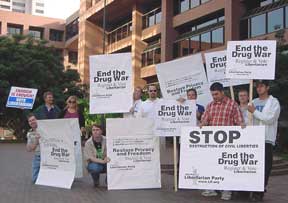 passing out
literature and matchpacks. The security guards have stopped trying
to intimidate or get us to leave the area, and the public seems
to be increasingly receptive to our message. passing out
literature and matchpacks. The security guards have stopped trying
to intimidate or get us to leave the area, and the public seems
to be increasingly receptive to our message.
Each rally has had one defining moment for me. The first rally
featured the lies and harassment of the federal security guards,
another the acknowledgement of a busload of sheriff's prisoners.
This last special moment occurred when an 81-year-old grandmother
approached me, wanting to know more about the Libertarian Party
and how we we're going to end the drug war.
I told her that drugs are health and personal choice issues,
not a law enforcement issue. The solution is family, education,
and treatment if desired, not more laws, cops and prisons. Basic
libertarian stuff. I know how hard it is to convince older people
that the government attitude toward drugs is mistaken.
My own grandmother is 82 and won't listen to a word of it.
The 81-year-old woman smiled and asked for some information on
the Libertarian Party. She told me about the problems with her
grandchild, how the stress of all the BS in the system had given
her shingles and how sometimes it just seemed hopeless.
We spoke some more on other topics. She thanked me for being
out there and said she was going to join the Party because she
was not done trying to fix this country. I look forward to seeing
her at the next End the Drug War rally or another Libertarian
event. She made the few hours that I spent out there absolutely
worthwhile.
Gardner Osborne welcomes emails.
Contact him at gardner@san.rr.com
A Citizen in action
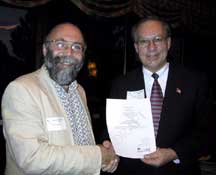 Senator Allard receives draft proposal
for increase in "good time" eligibility United States
Senator Wayne Allard (R-Colorado) accepts from Jack J. Woehr
of the November Coalition a copy of a "Proposal to Amend
Title 18 United States Code, Section 3624 ( c)," that would,
if Congress were to review and enact it, significantly decrease
the time drug prisoners would remain in prison. Senator Allard receives draft proposal
for increase in "good time" eligibility United States
Senator Wayne Allard (R-Colorado) accepts from Jack J. Woehr
of the November Coalition a copy of a "Proposal to Amend
Title 18 United States Code, Section 3624 ( c)," that would,
if Congress were to review and enact it, significantly decrease
the time drug prisoners would remain in prison.
Senator Allard and Mr. Woehr were attending the Jefferson
County, Colorado annual Lincoln Day dinner at the Marriott Denver
West Hotel in Golden, Colorado on February 23, 2002. The draft
proposal to increase 'good time' eligibility was written by prisoner
Jim Helms and brought to Mr. Woehr's attention by prisoner Glenn
Early, both nonviolent prisoners of the drug war.
Teresa Aviles named to NY Archdiocese
Advisory Board
Teresa Aviles of Bronx, NY has been asked to participate in
the formation of a special advisory board. The Archdioceses of
New York and Justice Works Community are currently collaborating
on a criminal justice reform project in New York State, funded
by the Catholic Campaign for Human Development.
Teresa founded the Isidro Aviles Memorial Chapter of November
Coalition to remember and honor her son who died mysteriously
in prison while serving a first-time, nonviolent drug prisoner.
This project will "educate citizens in New York State about
problems in the criminal justice system and encourage them to
take action to demand reform in criminal justice policy,"
wrote Teresa. One of the objectives of this initiative is the
formation of an Advisory Board composed of ex-prisoners and their
family members to oversee and administer the project jointly
with the Archdiocese and Justice Works.
Hemp Taste-Test Demonstrations
Target DEA Protests Held in 76 Cities
From The Week online with DRCNet, December 7, 2001
The hemp foods industry and drug reform activists staged coordinated
hemp food taste tests at Drug Enforcement Administration (DEA)
offices nationwide on December 4, 2001 to protest the agency's
recently revised administrative rules effectively banning 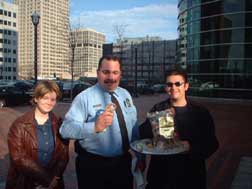 the sale and consumption of any ingestible
hemp products. the sale and consumption of any ingestible
hemp products.
Under the new rules, hemp bars, hemp pretzels, hemp ice cream
and similar products will become illegal controlled substances
effective February 6.
Hundreds of mild-mannered activists from Washington, DC, to
West Palm Beach, Oakland to Orlando, Seattle to Syracuse, as
well as at least 70 other cities, politely offered free hemp
food samples to DEA employees on their lunch breaks and curious
passersby, garnering considerable media coverage for the cause
in the process. While in most cities, demonstrators confronted
only the usual reflexive petty harassment the agency doles out
to unwanted visitors - unlawful demands that no photos of agency
buildings be taken, refusal to grant access to public spaces
- in Syracuse, NY, local police arrested and charged three demonstrators
for violating state marijuana possession laws, according to Syracuse
University SSDP member and arrestee Patrik Head.
They were in possession of hemp bars, according to one of
those arrested. At DEA national headquarters in Arlington, VA,
just across the Potomac River from downtown Washington, hemp
industry representatives including David Bronner of Dr. Bronner's
Magic Soaps and VoteHemp.com president Eric Steenstra joined
activists from the Marijuana Policy Project, Common Sense for
Drug Policy, November Coalition, SSDP, DRCNet and Green and Libertarian
Party members to encourage DEA agents to take a taste.
Met with barricades and uniformed Federal Protective Services
officers on their arrival, demonstrators were initially forced
completely off the property and even the bordering sidewalk,
onto the street. Fortunately, an Arlington city police officer
with traffic safety concerns prevailed upon the feds to allow
demonstrators onto the sidewalk.
Most DEA employees averted their eyes and scurried past the
proffered health treats, but not all. "Almost nobody from
the DEA would speak to me," said Alexis Baden-Meyer of the
Mintwood Media Collective, which was hired by VoteHemp to coordinate
the quickly-organized effort. "Some claimed to know nothing
about the hemp foods ban, others claimed to know everything about
it and wouldn't comment. One older employee refused, but told
me 'I'm going to wait until I'm 80 years old to try it, and then
I'll probably regret not having done it years earlier,'"
Baden-Mayer related. "With this rule, you won't be able
to find it in a health food store," she replied.
Mintwood Media head Adam Eidinger told DRCNet local TV news coverage
had reached nearly a million people, according to reports gathered
so far. "It will be more by the time we get it all tallied,"
he said. "We got coverage in lots of smaller media markets,
and some big ones too," Eidinger added. "We had three
local stations cover us in Philadelphia, two in Los Angeles,
one in the Bay Area. Tallahassee stations went wild, airing repeated
stories about the local event," he said. (Washington DC's
local ABC affiliate aired footage that included this author among
others.)
While hemp industry representatives pronounced themselves
satisfied with the demonstrations, they are not relying solely
on public opinion to win their struggle to be able to sell hemp-based
food products. "We have already filed a motion for a stay
of the new DEA rules," Steenstra told DRCNet. "We hope
for a ruling before Christmas, and if we do get a stay that will
be a very positive indication of the direction this case is going,"
he said. "We are also working with several Canadian companies
who are preparing to file claims that the new rules violate the
NAFTA agreements."
Do these protests work: (You'll leave this page, but read
this article in Eye on Congress: DEA's
get tough on health food goes soft
Hemp Education Day Reports!
Awesome Austin activists
By Karen Heikkala, Drug Policy Forum of Texas and
Regional Leader of the November Coaliton
We had a great time marketing the hemp energy bars, telling
people about the new law (criminalizing hemp products), and getting
signatures. Yes, the DEA office was dead here in Austin.
It's in an obscure location in the same building as Corrections
Software. I can only guess what they do there. In order to get
to their front door it is necessary to ring a bell, and they
then talk to you through a speaker and decide if they want to
let you up.
We decided to go where there was more action and took it the
health food stores. Four of us went in sets of two to do the
deed. We got about 130 signatures for the 2-3 hours it took to
pass out the samples.
Pennsylvania NORML - Hemp Education
Day
We rallied at the William J. Green Federal Building, DEA field
office in Philadelphia for this annual fall event. About 20 people
showed up to help distribute samples and literature. There were
no hassles by DEA or the police. People who took our samples and literature were very open minded. and literature were very open minded.
It was around 60 degrees and sunny, a beautiful day for a
protest. We handed out all of the energy bars, soft hemp pretzels,
and a bunch of packaged Hempzels. It lasted about two hours.
It was interesting because it seemed very formal. No tie-dyes,
posters, or chanting. Also everyone dressed well. If anything,
dressing up for the occasion really helped to show that we were
just ordinary folks exercising our right to assemble peaceably.
He freely took our pamphlets, literature and the latest issue
of Cannabis Culture magazine. "That looks like my ex-wife,"
he said about the woman on the front cover. I'm sure he'll take
it back to the precinct. I would have loved to see their faces
after finding the seed catalog inside. As we were leaving we
shook hands, and I thanked him for putting up with us. "No
problem," he said. "It's you who are right."
As for the Media, I believe we must continue to make our own
news, which means to keep holding events. More than ever before!
Having national protests not only feels good while you are doing
your part, but also shows how organized we have become.
Thanks to Diane Fornbacher and Daniel Klock for this summary.
Tampa vigilers have fun with
DEA
By Anthony Lorenzo of the Florida Organization for the Reform
of Marijuana Laws
Wow, what a fun December day. We stood out on Kennedy Street
armed with signs and pamphlets. Some of the signs read:
Stop the Drug War
Hemp = fiber + food
Asa Hutchinson and George Bush Jr. = dope
Picture of Uncle Sam pointing that read, "I want you in
prison."
Picture of Uncle Sam pointing saying, "I want your house,
money, jewelry..."
We stood out front across from the mall and waved our signs.
We attempted to give samples of hemp food and candy products
to everyone who walked by. Around 1:30 p.m., we went up into
the DEA's office on the fourth floor. I attempted to leave some
informational brochures in the office, but they rudely declined
my offer (Michael Moore would have been proud of us).
I wish we had brought a video camera because their reactions
were too amusing. Mike, the executive director of FORML, asked
why they did not wish to learn. He asked if the reason was that
if they knew they were wrong, then they would have to do something
about it. It was a lot of fun. There were only five of us, but
we made a statement.
Radio 88.5 interviewed me, and I attempted to get a plug in
on the Green Party. Since I could not say I officially represented
the Greens, I added that I also did work with various other organizations.
Also, I think TV News Channel 10 was there, and the reporters
interviewed John Chase, the Florida Regional Leader of the November
Coalition.
SSDP "Souder Squad"
Bushwhacks Congressman in home district
Rep. Mark Souder, the Indiana Republican responsible for the
anti-drug provision of the Higher Education Act (HEA), thought
he would be safe from students angered by the provision if he
held an event in his home district. He was wrong.
On February 22nd a delegation of Students for Sensible Drug
Policy members from Indiana, Illinois and Washington, DC made
the congressional drug warrior uncomfortably aware that his HEA
anti-drug provision - which has barred 43,000 students from receiving
financial aid so far this year - will make him the object of
protests and outrage wherever he goes. With Souder facing a strong
challenge in the Republican primary this spring, his authorship
and continued support of the provision could well become a drag
on his electoral chances.
The event in Fort Wayne was supposed to be a photo op time
for Souder. Instead, it turned into a footrace and heated parking
lot discussion between the fleeing congressman and students demanding
he repeal the provision before the congressman leapt into his
limousine and sped away into the night. Souder, along with Sallie
Mae, a student financial aid assistance corporation, was cosponsor
of "Paying For College," a forum for the public about
receiving federal financial aid for college. What should have
been a time for Souder to bask in his constituents' good will,
instead saw the congressman heading for the exits rather than
defend the HEA anti-drug provision.
"Souder had very little notice, but he knew we were coming,"
said SSDP media consultant Adam Eidinger. "We tipped off
the local media, and all three local TV stations and both local
papers showed up," he told DRCNet. "And we leafleted
beforehand, making sure everyone in attendance knew he wrote
the law denying aid to 43,000 students."
Although attendees expected a question and answer session,
Souder strode into the room saying he couldn't stay. "He
usually takes questions and answers," said SSDP national
director Shawn Heller, who confronted the congressman outside
the event. "But this time he only made a couple of brief
comments. When I yelled out 'Congressman Souder, a quick question,'
he bolted for the door," Heller said. "We followed
him, and the TV cameras followed us."
What followed was a five-minute discussion between Heller
and Souder as the cameras rolled, with the congressman growing
increasingly angry as his assertions were challenged. "What
really ticked off Souder was when Shawn started talking about
how the bill had never even been debated," said Eidinger.
"Souder got visibly angry then, shaking his hand beside
Shawn's head, and then he took off."
SSDP is keeping an eye on Souder's events calendar and will
be developing a strategy to have a greater presence in Souder's
district, said Eidinger. "There is an SSDP regional conference
in Chicago on April 12, and after that we will have a three-week
window to work this issue before the May 7 primary," he
said. "We're hoping to have students go into the district
and we're hoping to get students in the district out to vote.
This is an open primary, meaning anyone who is registered can
vote, and a few hundred votes could decide it," he added.
"If Souder's vote total drops by 2,000 votes, he could lose."
Souder is particularly vulnerable this year for a couple of
reasons. First, his old congressional district has been redrawn
this year; so he has largely lost the power of incumbency and
is competing for a new 3rd District. As important, he is facing
his strongest Republican challenger yet in former Fort Wayne
mayor Paul Helmke who has emerged as potent competition for Souder.
"You shoot one monkey to scare a hundred," said
Eidinger. "This is a campaign issue now, and Souder's opponents
can use his HEA anti-drug provision against him. If Souder goes
down, that will send a real message to other politicians who
are considering similar approaches."
Carolyn Lunman, an SSDP member from George Washington University,
was a member of the Souder Squad. "It was an exhilarating
experience to see Souder make an ass of himself," she told
DRCNet. "He had no response to anything we said because
there is no good response." As for continuing to shadow
the congressman? "He'd better watch his back," vowed
Lunman. "We'll be there."
Source: The Week Online with DRCNet, Issue #226
Christmas and activism from the
Bronx
By Teresa Aviles, founder of Isidro Aviles Chapter of November
Coalition
The Christmas party went very well this year. I had a great
crowd, including a schoolteacher who teaches special education
in Harlem with several children in her class who have parents
in prison. A few came with the parents and grandparent in one
case. An actor who was on vacation visiting family in New York
City also came by. He read Christmas stories to the children.
We were fortunate to find a church in mid-Manhattan at a modest
price. A December meeting with the League of Women Voters went
VERY well. Paul Bennett and I attended, and we both came away
with the same feelings. It was the first of four meetings held
in several places in NYC. There will be two more sessions, and
then there will be a combined meeting of all of the smaller groups.
I think it is very important that the League has come out
for this issue. The theme was balancing justice. We discussed
fairness and justice, drug policy reform, the prison industrial
complex and the fact that current drug policy was ineffective,
expensive and cruel. In the next session we will address what
should and could be done about this. If readers want to share
ideas that I could bring to these meetings, please let me know.
All in all I thought it was a giant step in the right direction.
Paul and I discussed some plans for our next couple events.
We have scheduled the 3rd annual Isidro Aviles' picnic for July
13, 2002. We will have some t-shirts made, and use them as a
fundraiser. Instead of doing the Mother's Day march this year,
we are going to send inmates a copy of our "disappeared"
poster, letting them know that we are out there doing what we
can for them.
November
Coalition in Las Vegas!
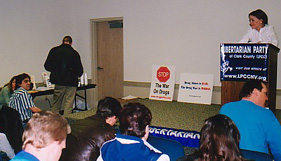
Regional leader, Debbie Dedmon has been a guest on a television
talk show, speaking in public forums, organizing vigils and more!
This recent article was written after Debbie and Judge Lehman
were both guests on a local television show.
Vegas judge brings compassion to drug war
By Lewis Whitten, Reprinted from Rebel Yell - Features Issue:
03/11/02
America's so-called drug war is tearing families apart as
sons and daughters are locked up far from home. Parents plead
for relief because they don't understand America's reason for
locking up their children for countless years due to a drug addiction.
 Nonviolent victims of the drug war continue
to receive ridiculous prison sentences, but at a courthouse in
downtown Las Vegas, there is a glimmer of hope for a more compassionate
policy towards drug users trapped in the criminal justice system. Nonviolent victims of the drug war continue
to receive ridiculous prison sentences, but at a courthouse in
downtown Las Vegas, there is a glimmer of hope for a more compassionate
policy towards drug users trapped in the criminal justice system.
Thanks to Jack Lehman, Clark County's Drug Court judge, many
drug-law offenders now receive treatment instead of prison time.
"I became interested in the whole question of doing something
about drugs shortly after I got on the bench," Lehman explained.
"It disturbed me tremendously after I'd been on the bench
for only two years that I was seeing the same defendants that
I had already sentenced to prison or to probation. "More
frequently than not, they would violate probation, be revoked
and end up in Nevada State Prison," he said.
In 1990, Lehman attended a presentation by three officials
from the Miami Drug Court concerning a study about the price
fluctuation of cocaine in response to big drug busts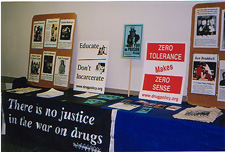 . It was believed
that a big drug bust would cause the price of cocaine to increase,
but the study found that this wasn't the case. . It was believed
that a big drug bust would cause the price of cocaine to increase,
but the study found that this wasn't the case.
"The price of cocaine didn't fluctuate five cents regardless
of the size of the bust," Lehman said. "The war on
drugs, which spent hundreds of billions of dollars trying to
prevent cocaine from coming into the country, didn't stop it
at all." The result: Miami created the country's first drug
court that focused on treatment for users instead of punishment.
"I really got excited about it because it seemed to me
that if there was a solution to getting people off of drugs,
it seemed that the Florida Drug Court had found it," Lehman
said. "So I approached the Clark County Commission, told
them about all of this and asked them to help me start a drug
court here in Las Vegas." By 1992, Las Vegas was home to
the United States' fifth drug court.
Treatment is available to all defendants and lasts one year.
Participants must abstain from all drugs, including alcohol,
and attend counseling sessions. Job counselors are also available
for job training assistance, and most find employment by the
end of the first month. "This program works," Lehman
said. "If someone wants to get off drugs, this program will
get them off drugs."
The rehabilitation center is located on South Valley View
Boulevard, not too far from downtown Las Vegas. When I visited,
one participant was yelling and swearing because she just failed
a urine test. She drank the night before. Her behavior went unnoticed,
disturbing almost no one. Business proceeded as usual. Another
participant was quick to point out that Judge Lehman is very
fair.
Many states have adopted this approach. Unfortunately, the
federal government has not let up in their unique attempt to
create a drug-free America. They continue to place stiff penalties
on drug users, many with sentences longer than murderers and
other violent criminals.
"I would rather see the federal government let the states
handle it because I think the states are now doing a good job,"
Lehman said. "The destructive things the federal government
has done is [instating] these mandatory minimum sentences. "If
someone is caught three times with small amounts of pot or a
small amount of any drug, putting them in prison for 20 years
is a terrible thing, and it doesn't accomplish anything,"
he said.
Currently, there are more than 1,000 similar drug courts in
the United States, and, according to Lehman, they appear to be
working. "It restores people to their family, which I think
is really important and gives the drug addict a new life,"
Lehman said.
Some critics of drug courts suggest that the program is flawed.
In order for a drug user to get treatment, they have to get arrested.
Lehman points out that outlets like the Salvation Army provide
treatment on a voluntary basis, but suggests that some users
need coercion to kick the habit.
"There's no great desire by many of them [to stop using
drugs], unless they've been on drugs 20 or 25 years and finally
come to their senses," Lehman said. "There's nothing
that's telling them to quit using drugs." Debbie Dedmon,
the November Coalition's Las Vegas coordinator, is critical about
that attitude.
"Many users do have incentives outside of the courts.
Drug addicts often lose contact with family and friends. They
end up in the streets," Dedmon said. "They may lose
their home, wife and kids. That's why the Salvation Army has
waiting lists up to a year to get into their drug treatment program."
The November Coalition believes many drug users could be considered
non-problematic and don't need treatment or prison. They may
use an illicit drug recreationally, similar to how politicians
might use alcohol. Judge Lehman doesn't buy that argument.
"I don't condone drug use because it's against the law
and I'm a judge," he said.
Another concern suggests that by providing treatment for drug
users, we are treating drug addiction as a disease, and we can't
arrest people for having a disease. "I don't agree it's
a disease at all," Lehman said. "It's a voluntary act
by the individual."
Dedmon points out that "regardless of whether or not
addiction is a disease, it is obvious that in the current political
atmosphere drug courts are the best option for users caught up
in the system."
What I'm doing
By Larry Schulenberg, parent of drug war prisoner
I remember wondering some time ago - after seeing and pondering
the slogan "There is no justice in the war on drugs"
on the backs of envelopes - how many people handle my mail. I
usually drop my letters, bills, cards, and packages in the box
outside the downtown post office before 5:00 p.m. when the mail
is taken inside the Post Office. Between that drop off and the
destination halfway across the country I would estimate that
hundreds of United States postal employees have their hands on
my mail.
That's in addition to the sorters at Sears and Visa and Mid-American
Energy. And then there's the people who open it and send it to
the appropriate clerk. Hundreds, maybe more. So I made a trip
to Office Max or Office Depot or Wal-Mart, I can't remember which,
and bought a package of 1 x 3-inch mailing labels.
On each label I typed, "Incarceration is not the way
to fight the War on Drugs. We should fight the demand, not the
supply, helping the victims, not punishing them." I printed
a couple dozen labels. The next time I paid my monthly bills
- the mortgage, a car loan, credit cards, utilities, my cable
TV, and other payments - I stuck one of those labels on the envelope
flap.
After two weeks of using that slogan, I decided that the mail
clerks and secretaries at Firstsar and Principal must be tired
of reading that "incarceration is not the way to fight the
war on drugs." I then searched through information packets
about the state of federal prisoners and created, "Mandatory
minimum sentences not only ruin the lives of prisoners and their
families, but they drain the taxpayers of billions of dollars."
The following week, I revised that slogan to read, "Mandatory
minimum sentences drain the taxpayers of billions of dollars
that could be used to help homeless people, children, the ill
and the elderly." Men in the prison camp where our son is
confined saw the labels and remarked favorably to him.
I returned to my computer and wrote, "55% of all federal
drug offenders are low-level offenders-not the drug lords for
whom the mandatory minimum sentencing laws were intended."
I found more information that I thought might inspire citizens
to get involved with the cause. I learned that the National Association
of Veteran Police Officers, American Bar Association, NAACP,
ACLU, and NOW oppose mandatory minimum sentences.
Other labels included, "Mandatory minimum sentences treat
first-time, nonviolent offenders the same as habitual criminals."
One that I especially like is, "Drug Czar John Walters promised
a review of the Mandatory Minimum Sentences. WHEN?"
I have no idea if Mr. Walters has read my label, but I am fairly
certain that an aide in Senator Tom Harkin's office, an employee
who works for Senator Charles Grassley, and someone in Representative
Greg Ganske's office have. Weekly or every other week, I send
email messages to those three legislators, and then I follow
up with a snail mail. Of course, one or more labels are attached
to the envelopes.
Maybe, just maybe, as I hope and pray, a person I probably
don't know may read one of my labels and begin to question and
ask, "What's going on with Mandatory Minimum Sentences?"
I also use one of my messages as signature on my email messages.
Maybe one of those people might be inspired to learn more
about the war on drugs, mandatory minimum sentencing, alternatives
to incarcerating low-level offenders, and the billions of dollars
in public costs to maintain these failed policies of social control.
Drug Czar John Walters' promised to review mandatory minimum
sentences. As he rolls that first review, let another snowball
of public dissent begin its journey, gathering names and calling
roll. Soon after that roll call, we will see changes in the drug
laws.
The Drug War is Cold!
Philadelphia, PA vigil - February 2002
Organizers Diane Fornbacher and Daniel Klock with volunteers.
 Back to
Top
The Razor Wire is a publication of The November Coalition,
a nonprofit organization that advocates drug law reform. Contact
information: moreinfo@november.org
Back to
Top
The Razor Wire is a publication of The November Coalition,
a nonprofit organization that advocates drug law reform. Contact
information: moreinfo@november.org
282 West Astor - Colville, Washington 99114 - (509) 684-1550
SUBSCRIBE TODAY!

|





